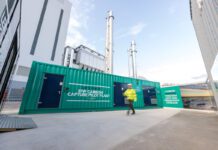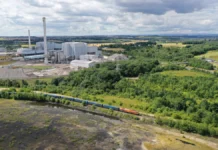
Key energy-from-waste (EfW) operators in the UK published a manifesto on 13 June, setting out steps policymakers and industry could take, to help the sector advance UK emissions reduction efforts. The alliance, Resource Recovery UK, comprises Cory, Encyclis, enfinium, Veolia and Viridor.
“Manifesto for a Sustainable, Circular Future” defends the sector’s position, as a key contributor to national goals like net zero, while also seeming to pinpoint critical points in the policy landscape that require attention, if the country is not to – for example – incentivise landfill over EfW.
As the executive summary explains, “2023 is a critical year, with decisions to be taken that will impact the sector for decades.”
The document calls for a number of measures, including:
• A carefully sequenced expansion of the UK Emissions Trading Scheme (ETS) to include waste incineration (with no energy
recovery) and EfW, no earlier
than 2028;
• Measures to prevent both waste exports landfill from becoming cheaper than EfW;
• Policies to support EfW facilities’ ability to decarbonise key industries communities;
• Support for the development of heat networks in the UK;
• Recognition of EfW’s contribution to the green economy, for example bringing critical waste infrastructure into the scope of the upcoming National Infrastructure Assessment.
The EfW sector plays a crucial role, given the “simple fact that not all waste can be recycled or reused, requiring infrastructure that can provide a safe and sustainable solution to what remains,” as one section points out.
Only around 44% of the waste produced by UK households each year is recycled, showing that “more must be done to increase our recycling and reuse rates”, says the document, but in the meantime, there’s still around 29 million tonnes of residual waste to be dealt with – and at the moment, around 47% is sent to landfill.
EfW offers a more sustainable route. “By recovering energy, heat, metals and ash from the nation’s non-recyclable waste, our facilities recover resources that prevent the use of virgin materials, thereby contributing to a circular economy. Through our investment in new technologies for carbon capture and storage and heat networks.”
“We actively support efforts to prevent waste whilst boosting recycling rates, particularly of plastics which are a major contributor to the sector’s carbon emissions. Progress has been made, but now is the time for more ambitious action.”
Crucial role for ETS
A critical element is the government’s proposed expansion of the UK Emissions Trading Scheme (ETS) to cover waste incineration and EfW. “We believe it will play a critical role in accelerating the decarbonisation of the sector by incentivising operators to adapt their practices and adopt innovative technologies.”
One example is Cory’s Carbon Capture and Storage (CCS) project on the Thames, which will apply CCS to the UK’s largest single-site EfW operation, with the potential to create the world’s largest single-site EfW decarbonisation project. It will capture around 90% of the emissions from the existing EfW facility, and also a new facility to be built adjacent to it by 2026.
The Thameside location also means this captured carbon can be transported by ship to undersea storage locations, fulfilling the requirement for “a non-pipeline transport option” specified in the Government’s recent update to the CCUS cluster sequencing. “By 2030, the project could capture c.1.3 million tonnes of CO 2 per annum – providing a significant contribution to reducing the carbon emissions of the several million people Cory serves in London and the South East.”
The manifesto’s authors want to see the UK ETS expansion supported by measures “to prevent landfill from becoming cheaper than EfW, ensuring that the cost of landfill rises with inflation and the cost of emissions trading.” It should also “include measures to reduce our reliance on landfill and foreign waste exports” and “Be swiftly followed by bringing carbon removals into the UK ETS from 2030.”
Plastics plea
It also asks for “timely delivery of upstream interventions to reduce the amount of plastic reaching EfW plants.” These would include introducing EPR and consistent kerbside collection “at the earliest opportunity” and advancing the Plastic Packaging Tax timetable “to drive the value of recycling and reprocessing plastic.”
The document also set out ways in which the sector will be able to boost national decarbonisation efforts. Heating homes and buildings – with waste heat – is a big one since these plants are so often located near urban centres, and the EfW process “produces large volumes of stable, reliable heat”. The UK is not doing enough here, and is lagging behind countries like Denmark, where EfWs are required by law to divert their waste heat into such schemes. The result? District heating currently supplies around 64% of Danish homes.
The power generated by EfW plants could also be exploited by power electrolysers for the generation of green hydrogen, for use in industrial facilities or transport.
These kinds of initiatives are already underway, explains “Manifesto for a Sustainable, Circular Future”. In 2021, 12 EfWs in the UK exported heat for beneficial use alongside power with an estimated total export of 1,845GWhth.
But more could be done, and the authors outline practical steps, including identifying dedicated heat zones around well-situated EfW facilities, and providing taxation alignment on domestic heating and heat networks to ensure a level playing field. Also, waste heat should be brought within the remit of Ofgem, to ensure consumers get a fairer deal. And when it comes to hydrogen, the government could support these kinds of initiatives through its Net Zero Hydrogen Fund.
RRUK members are responsible for the operation of 24 energy recovery facilities across the UK. The sector processes annually 15.32 million tonnes of non-recyclable domestic and commercial waste that would otherwise be sent to landfill or exported overseas. In doing so, the sector generates 9,428GWh of baseload electricity – enough to power around three million homes[2] – while recovering valuable materials, such as ash for reuse in construction aggregates.
The group is affiliated to the Environmental Services Association (ESA), which represents the wider resource and waste management industry.





